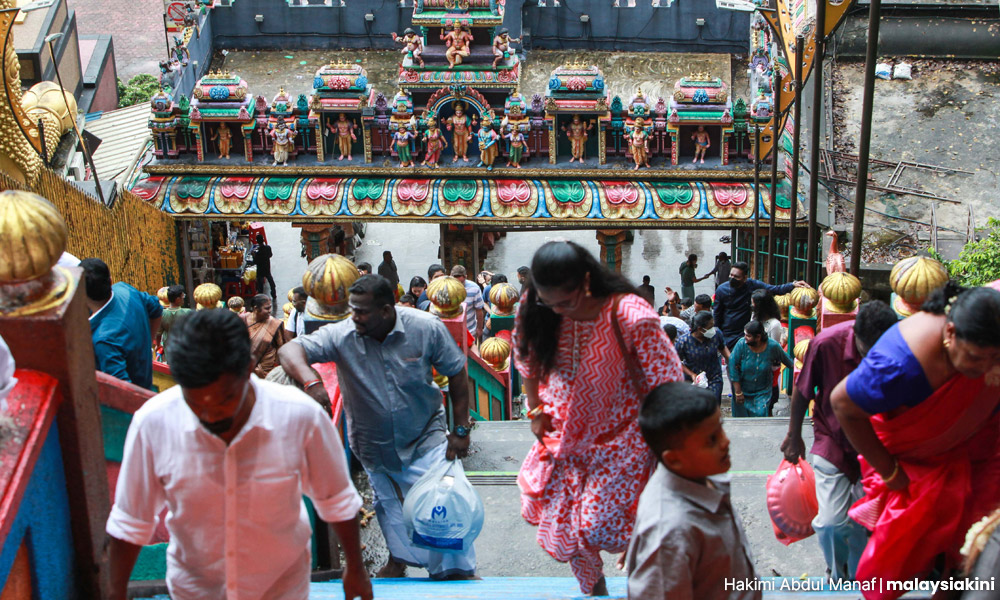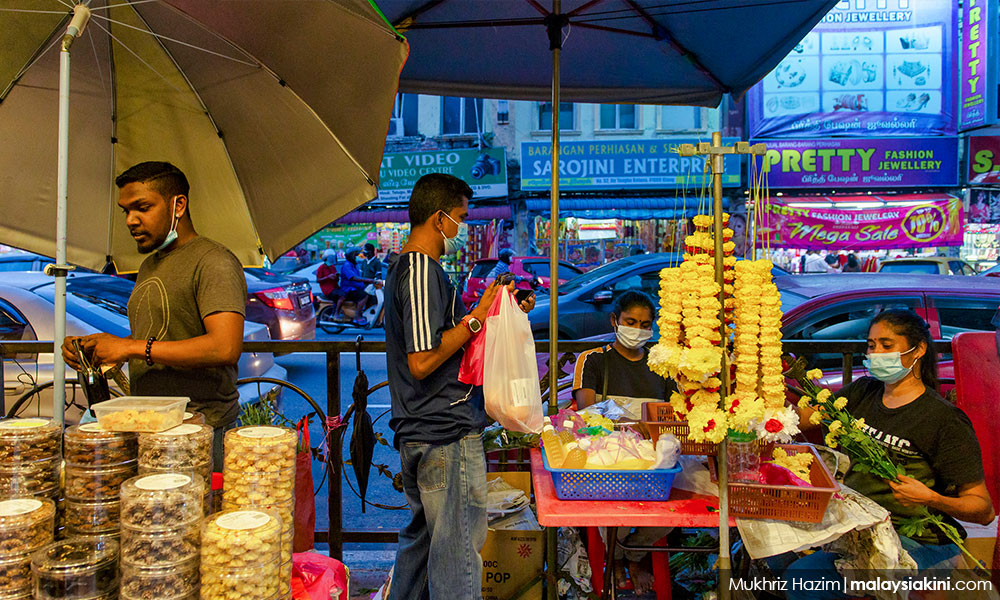
S Thayaparan
“The victim who is able to articulate the situation of the victim has ceased to be a victim: he or she has become a threat.”
COMMENT | In one way or another, political parties have failed the Indian community. Of course, the Indian community is a culturally diverse polity divided along class lines, so political parties as a shorthand to chart the course of the entire community was always a misguided effort.
While some have no qualms about self-identifying as “Indian”, many take exception at being lumped in with the general “Indian” community, preferring to self-identify along cultural and language lines.
I suppose it is part pride and part escaping the homogeneity imposed by the state but, whatever the reason, solidarity has always been a problem for the Indian community.
Talking about the Indian issue is an invitation to dive headfirst into the rabbit hole of Malaysian politics. It is a place where the Bangsa Malaysia Kool-Aid means never talking about race even though racial politics fuels the rhetoric and policies of Umno/Pakatan Harapan.
It is a wonderland of Madani where the social contract is used as a sword against egalitarian values and an example of harmonious mutual co-existence.
Indian participation in DAP, for example, has a rich history. But obviously, the present disfranchisement of a certain section of the Indian community does nothing to bolster the argument that said history was sufficient mainstream dissent when it comes to Indian communal interests.
Is it any wonder that talking about the “Indian” issue becomes problematic? The reality is that opposition politics is urban. Umno/Harapan knows this, so it coddles its rural voting base.
Harapan politics is supposed to be race-blind, but the reality is that it only appears race-blind because of propaganda, not substance. Folk often point to the fact that Harapan has more Indian (for example) representation, but we all know this means nothing.
Whatever promises are made to the Indian community do not mean much. How exactly, if the community is not a significant voting bloc, will those who break promises be held accountable?
“The victim who is able to articulate the situation of the victim has ceased to be a victim: he or she has become a threat.”
- American writer James Baldwin
COMMENT | In one way or another, political parties have failed the Indian community. Of course, the Indian community is a culturally diverse polity divided along class lines, so political parties as a shorthand to chart the course of the entire community was always a misguided effort.
While some have no qualms about self-identifying as “Indian”, many take exception at being lumped in with the general “Indian” community, preferring to self-identify along cultural and language lines.
I suppose it is part pride and part escaping the homogeneity imposed by the state but, whatever the reason, solidarity has always been a problem for the Indian community.
Talking about the Indian issue is an invitation to dive headfirst into the rabbit hole of Malaysian politics. It is a place where the Bangsa Malaysia Kool-Aid means never talking about race even though racial politics fuels the rhetoric and policies of Umno/Pakatan Harapan.
It is a wonderland of Madani where the social contract is used as a sword against egalitarian values and an example of harmonious mutual co-existence.
Indian participation in DAP, for example, has a rich history. But obviously, the present disfranchisement of a certain section of the Indian community does nothing to bolster the argument that said history was sufficient mainstream dissent when it comes to Indian communal interests.
Is it any wonder that talking about the “Indian” issue becomes problematic? The reality is that opposition politics is urban. Umno/Harapan knows this, so it coddles its rural voting base.
Harapan politics is supposed to be race-blind, but the reality is that it only appears race-blind because of propaganda, not substance. Folk often point to the fact that Harapan has more Indian (for example) representation, but we all know this means nothing.
Whatever promises are made to the Indian community do not mean much. How exactly, if the community is not a significant voting bloc, will those who break promises be held accountable?

How exactly does a community whose political leadership, either establishment or opposition, are constantly told they are there because the votes of the Malay and Chinese effectively advocate on behalf of their community?
What mainstream politics has demonstrated is that representation more often than not means appeasement and political survival.
Because politics in Malaysia is race-based and the alternative media (especially the English media) is defined by the crudest partisan expectations, issues like tokenism, appropriation, and crypto-racism, are subsumed beneath a steady diet of Perikatan National’s transgressions and socio-political red herrings.
However, to highlight Indian participation in the DAP would be disingenuous, considering that ethnic relations in this country have always pivoted on the Malay-Chinese axis. All this talk of multiculturalism is, in reality, the state of race relations between the Chinese and Malay community.
Just another proxy
The last thing the Indian community needs is another political party. Indian political parties have always existed as proxies for the establishment anyway.
When independent parties or voices crop up, they are either co-opted by mainstream parties or vilified, hence an Indian party without significant demographic support would be just another target for Umno/Harapan.
This is not to say that certain Indian opposition politicians have not attempted to address certain issues - statelessness, for example - and navigate the extremely tricky terrain of mainstream racial politics, but rather any “issues” that do not have mainstream appeal with regard to the current Malay-Sino dialectic gets very little attention.
This is not to say there have not been genuine Indian political operatives - former Penang deputy chief minister P Ramasamy being one of them and former Klang MP Charles Santiago.
Here is Charles pushing the education hot button - “Such discriminatory practices that deny children a better future just because of their race would only end up sowing hate and animosity amongst the different races.
“So, instead of lamenting about the state of education, (then education minister) Mohd Radzi (Md Jidin) must instead create a system that’s fair to all Malaysians irrespective of race or religion.”
Vulnerable targets
PN really does not care about the Indian community, other than understanding that their support especially in close races could be crucial, and they are also the low-hanging fruit for religious assimilation, especially disenfranchised Indians.
The Department of Islamic Development Malaysia (Jakim) has programmes targeted at disenfranchised Indians and has independent Indian preachers who specifically target vulnerable groups.
This is what young disenfranchised Indians are dealing with in this country as are Indian activists who do not get air time on the mainstream, supposedly independent English press.
In other words, the system is specifically targeting vulnerable Indians, with the agenda that assimilation would give them better lives. This is what people are dealing with. So it is not as if Indians are sitting around throwing pity parties.
Anecdotally speaking, I know many young Indian NGOs who want nothing to do with political operatives who come snooping around attempting to use them as grassroots propagandists.

They understand the system is against them and that political operatives are part of the system. Besides, as one of them told me, they are too busy filling up forms and moving through an overtly racialised bureaucracy to help their Indian clients canvas for votes.
It is strange, though. For decades, Anwar Ibrahim for a myriad of reasons enjoyed extremely healthy support from the Indian community.
But these days, as prime minister, he and Harapan are slowly but surely losing support from the community. These days, Anwar seems more interested in bullying a young student who asks him genuine questions about educational opportunities in Malaysia or presiding over a conversion ceremony of a young Indian convert.
This is exactly the state of play that disenfranchised Indians have always found themselves in. Indians, however they identify, should strive to be as independent from the system as humanly possible.
Indians, especially disenfranchised Indians, do not have the luxury of engaging in partisanship nor can they indulge in the numerous political outfits that claim to champion their cause.
There is no true course for the Indian community. Our fate shall be the same as that of all the non-Malays but it is just that we will get there sooner.
S THAYAPARAN is Commander (Rtd) of the Royal Malaysian Navy. Fīat jūstitia ruat cælum - “Let justice be done though the heavens fall.”

No comments:
Post a Comment